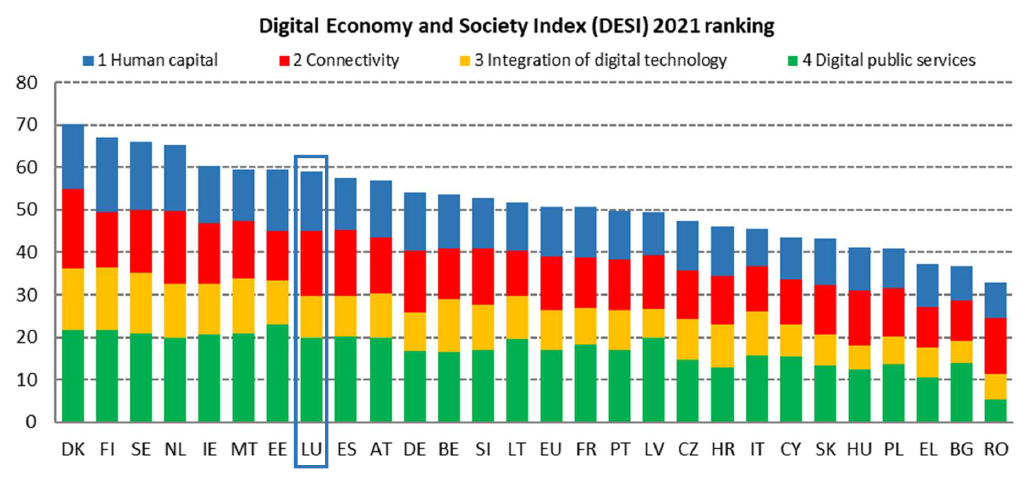Published by the European Commission, the Digital Economy and Society Index (DESI) summarises indicators on Europe’s digital performance and tracks the progress of EU countries. Luxembourg ranks 8th in the 2021 edition of the index, and has constantly increased its overall score ever since the first study published in 2021. Denmark, Finland and Sweden come out on top in this year’s ranking.

The index covers four interdependent areas that are evaluated based on 33 individual indicators:
- Human capital (digital skills, ICT specialisation)
- Connectivity (Fixed broadband take-up, fixed broadband coverage, mobile broadband and broadband prices)
- Integration of digital technology (business digitalisation, e-commerce, digital intensity of SMEs)
- Digital public services (e-Goverment)
Outstanding connectivity
As previous years, Luxembourg performs very well in the field of connectivity and ranks 4th in the EU. The country is almost fully covered by fast fixed broadband networks and has very good coverage of very high-capacity networks (VHCHs). Thanks to the wide availability of VHCNs, Luxembourg performs very well in the take-up of fixed broadband services and 53% of households have opted for speeds of 100 Mbps and above. It scores 61% on the 5G readiness indicator, while 4G coverage stood at 99.8%.
Strong human capital
In the Human capital dimension, Luxembourg ranks 6th. It ranks above the EU average on the three digital-literacy indicators. Luxembourg continues to report an increase in the share of ICT specialists as a percentage of total employment and is well above the EU average (6.3% and 4.3% respectively). 20% of specialists are female, slightly above the EU average of 19%.
Progressing performance
In digital public services, Luxembourg has made major progress. It now ranks 11th in the EU, significantly improving its score to more than 11 percentage points higher than the EU average. The country performs particularly well and ranks 3rd in the EU in the provision of digital public services to businesses, scoring 97 out of 100, against the EU average of 84. By contrast, there is an average level of online interaction between public authorities and the public: 64% of individuals used the internet in 2020 to interact with public services.
On the integration of digital technology by businesses, Luxembourg ranks 14th. Consistent with the country’s ambition to make the transition to a data-driven economy, Luxembourg has made major progress in the uptake of digital innovation. In particular, it performs well on the share of companies that analyse big data (19% versus the EU average of 14%, ranking 9th). A high share of companies (41% versus the EU average of 36%) uses enterprise resource planning software to share information between different functional areas such as accounting, planning, production and marketing. By contrast, Luxembourg continues to perform well below the EU average on the share of SMEs selling online, with only 9% compared to the EU average of 17%. Furthermore, only 8% of SMEs sell online to other EU countries.
Photo: © Luxinnovation/Vincent Remy

